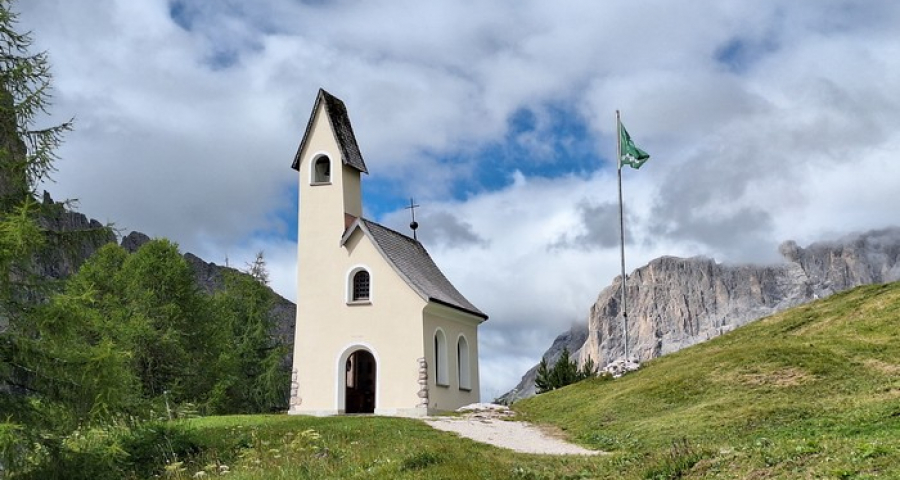In the belly of the Word/4 - The great fish makes us experience becoming as small as a fetus
by Luigino Bruni
published in Avvenire on 10/03/2024
" The Lord had created the fish that would host Jonah when he created the world. It was such a large animal that Jonah was comfortable inside it as if he was in a big synagogue: its eyes were like windows and there was also a diamond as bright as the midday sun that allowed the prophet to see everything in the sea as far as the deepest depths »
L. Ginzberg, The Legends of the Jews, VI
Jonah had embarked for Tarshish to flee “from the presence of the Lord” (Jonah 1:3). His was an illusion of escape: he knew that, but he still ran away. Like us, when despite knowing that there is no place on earth or in heaven where we can take refuge to escape from our life, we still run away, we delude ourselves, we know that we are deluding ourselves and yet we flee. But once aboard the wrong ship that was supposed to take him ‘away’ from the Lord, Jonah began to carry out a mission similar to the one from which he was fleeing: he converted pagans for the first time and he did do unintentionally, because the mission from which he was fleeing was precisely the conversion of the pagans of Nineveh. He did not want to convert the pagans of Nineveh but he converted the pagans on the ship. In fact, at the beginning of the storm the captain called God by the generic name of ‘Elohim’ (the gods) ["Get up and call on your Elohim! Maybe Elohim will take notice of us and we will not perish” (1,6)], but after Jonah pleaded guilty and therefore responsible for the great storm, those pagan sailors begin to pray to God with the name of YHWH: “At this the men greatly feared YHWH and they offered a sacrifice to YHWH and made vows to him ” (1,16).
Jonah fled from his vocation, but during that flight he began to fulfil it. When we look at the dynamics of true vocations, both religious and secular, we realize that the Jonah paradox is more common than we think. We flee from a convent, a community, a job, a family; everyone runs away for a different reason but everyone runs away because they can't help it. We go in the opposite direction to avoid dying and while we go so as not to do what we should do, we find ourselves, unwittingly and unknowingly, achieving something very similar, if not identical, to what we were fleeing from. We left everything to follow a call, and one day we felt we had to leave again but in the opposite direction. We embark towards Tarshish, ‘to flee from the Lord’, and in that counter-journey we finally find ourselves taking care of the poor, of humanity, taking care of the suffering of men and women. We had fled from a life but that same life awaited us along another path and we didn't know it. These vocations fulfilled in the opposite direction are very painful, but they also have their own typical beauty linked to gratuitousness. In the vocations fulfilled on the ordinary and beaten paths there are many beautiful and good things but the beauty of this gratuitousness may be lacking, the one that arises from renouncing voluntarism, where fruits do not come because we sought them and wanted them: they just come, often despite us. And those who encounter this gratuitousness experience a special lightness, one liberated from the obligation of gratitude, because fruits and conversions happen outside the register of intentions: they just happen, everything is truly only grace. If life were only the development of a score written by us or by someone else for us to play, the job of living would be extremely monotonous and boring; and instead it is beautiful because the decisive crossroads was different from the one we missed, the most important appointment was different from the one we missed, the best and tastiest fruits were not those that withered on the tree we had abandoned but those that will be born in the land not yet put to fallow.
“But the LORD provided a large fish to swallow up Jonah; and Jonah was in the belly of the fish for three days and three nights.” But … Here is another beautiful adversarial conjunction of this book, which this time concerns not Jonah but God. The sailors carried out their ritual of ‘scapegoating‘, they threw Jonah into the face of the waters to lighten the ship from the only ballast that, according to them and Jonah, was causing the ship to sink. Throwing Jonah into the sea calmed the storm, the crew became convinced of the truth of their causal link which reinforced their mistaken beliefs about life and about God - the earth is full of mistaken beliefs that are given a religious chrism. But God intervened to save Jonah, arranging for a great fish to swallow him, a swallowing that contained salvation. A great fish that has inspired a lot of art and literature, from the Moby Dick Whale to the Pinocchio Dogfish, a fish that in popular culture has become more famous and familiar than Jonah himself.
These ‘three days and three nights’ have generated countless rabbinical allegorical and Christian readings over the centuries (Midrash of Jonah). For Matthew (12:39) the ‘sign of Jonah’ mentioned by Jesus is these three days and nights in the belly of the fish, a prefiguration of his death and resurrection and for Gregory of Nyssa this episode is "the clearest of the prophetic signs" (Migne (PG) 46, 604). A detail. The word ‘fish’ appears in the masculine (dag) in verses 1 and 11 of the second chapter, while in verse 2 we find it in the feminine (dagger). Ancient commentators have sought to interpret the change in the gender of the fish found in the Hebrew text in the most varied ways. I'll add another one.
When the biblical reader arrives at the scene of Jonah being thrown on stormy waters and there he encountered a 'great fish’, the setting leads him to see in that fish an additional element of death. He immediately thinks of the Leviathan, the sea monster that we find in the Psalms (104:26), in Isaiah (27:1) and in Job (40:25). The Hebrew text uses the masculine dag for ‘fish’ only at the beginning and then at the end, when that monster ‘vomited’ Jonah on dry land. But when Jonah, after being left as prey to the sea, found himself alive in the belly of the great fish, the context changed. There the fish became good, Jonah experienced a great fish of salvation. That belly became a place of life, of salvation, of landing, of fetal position: hence the gender change, dag becomes a dagger.
To better understand it, a verse from Psalm 37 helps us: "Commit your way to the LORD” (37:5). The Hebrew verb used by the Psalm is galàl, which as Guido Ceronetti (The Book of Psalms) reminds us refers to being wrapped up, like a ball of yarn, rolled up, reminiscent of the cocoon of a silkworm, ‘the candyfloss around the splint’, the curling up of the fetus in the maternal womb. Jonah, saved from death, perhaps for its author has the same experience as the psalmist, the experience of feeling inside a coil, inside the maternal organs of God, of a woman's womb. The meaning and metaphorical strength of the male womb are not the same as those of the mother’s womb. In fact, the innards, womb, (rhm) are at the basis of the Hebrew word that we translate as rehem/rehamîm mercy: "Can a woman forget her nursing-child, or show no compassion for the child of her womb? (Isaiah 49:15). The Gospels use the equivalent Greek word (splanchnízesthai) for Jesus, who is moved by the Good Samaritan or the merciful father of the prodigal son, but the model remains the maternal innards even when it is us men who are merciful - and sometimes we can be. That ancient Jewish writer knew that the belly that swallows food is not the belly that preserves life, and perhaps to express this, he changed gender of that great fish. We must not lose the meaning of that added letter (dag-daga), because a presence of Elohim, not only of the devil, is often hidden in the details.
In this good, warm and maternal belly, Jonah had a new experience: Jonah prayed. And he did so with one of the most beautiful psalms in the Bible, which is found outside the Psalter, hidden in a booklet that is underestimated from a spiritual and ethical point of view. As Jonah experienced the womb, he felt another presence of God there and so he prayed. Plunged into the abyss, having touched the bottom first of the ship and then of life, saved by a good womb, Jonah returned to prayer. And in this gesture he reveals something precious about what prayer really is in the Bible.
There, in that good belly, Jonah became a friend of many psalmists, of Job, of Isaiah, of Christ and of the many men and many women who have learned to pray inside the belly of the great fish of life found again after a death - their own, of a son, of those we love, of God. Jonah had fled from the voice of God who gave him a task, a mandate, an embassy, all masculine registers, from an encounter with the fish-Dag.
"Jonah had fled from the voice of God that gave him a task, a mandate, an embassy, all in masculine registers, from an encounter with the fish-Dag. To start praying again, Jonah had to flee, he had undergone the subjective experience of guilt, until he felt responsible for the misfortune and death of the crew of a large ship. And after the ‘great city’ of Nineveh, the ‘great ship’ and the ‘great storm’, he was eaten by a great’ fish- dāg; and inside that great belly he experienced returning small as a fetus, he found himself curled up inside a small maternal belly that he recognized to be the very belly of God. It is from the small womb of God that prayer can rise again. When life has reduced us so small as to pass through the eye of a needle, after meeting the Lord of armies, the almighty, the most perfect creator of heaven and earth, it may happen that we finally curl up in a womb, in a ball. We go back to when we were small, children and beyond the eye we see another Kingdom. In life we learn to pray many times. We begin by reciting the prayers that others teach us and with these good prayers from parents and grandmothers we go on for a long time. Then come the prayers of the community, the richest and most colourful ones, and with these we go on for many more years. Until one day we forget the language of God and the angels. We forget all the prayers, and we find ourselves on a ship that takes us to the wrong place and we know it well. On that trip we thought we were going to die but we are still alive. We find ourselves inside a place that has become very small, and we discover that we had not forgotten all the prayers: there was still one left, the simplest one from when we were small. With that we weave our cocoon, and in that ball we recognize the maternal womb of God. Yesterday was not the end of the prayer, it was just a death that prepared the resurrection of the third day.













